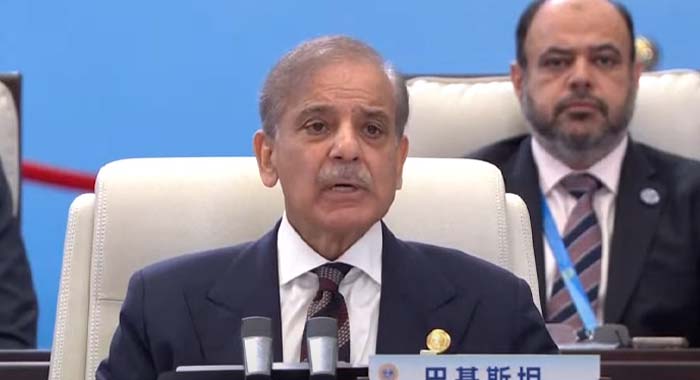Prime Minister Shehbaz Sharif on Sunday reaffirmed Pakistan’s commitment to regional peace and stability, declaring that while Islamabad seeks stable relations with all neighbours, extremism and terrorism remain a grave threat to regional security. Addressing the 25th Shanghai Cooperation Organization (SCO) Summit in Tianjin, the premier thanked Chinese President Xi Jinping and the government of China for their “outstanding hospitality and excellent arrangements.” He also extended felicitations to Uzbekistan and Kyrgyzstan on their independence days, adding that the SCO symbolizes Pakistan’s long-standing commitment to regional cooperation and integration.
The prime minister praised China’s achievements, calling them the result of President Xi’s “visionary and wise leadership,” and highlighted Beijing’s growing global role. He reiterated Pakistan’s belief in multilateralism, dialogue, and diplomacy, stressing that sovereignty and territorial integrity are sacrosanct principles. “Pakistan respects the sovereignty of all SCO member states and its neighbours and remains fully committed to international and bilateral agreements,” he said.
Highlighting the importance of the China-Pakistan Economic Corridor (CPEC), Shehbaz described it as a “landmark project of mutual benefit.” He reaffirmed Pakistan’s adherence to the UN and SCO charters, while strongly condemning Israel’s “unjustified and unacceptable aggression” against Iran and terming the humanitarian catastrophe in Gaza “an unending wound on our collective conscience.” He reaffirmed Pakistan’s unequivocal support for a UN-backed two-state solution in Palestine.
Turning to security challenges, Shehbaz Sharif said Pakistan has credible evidence of foreign involvement in terrorist attacks in Balochistan and Khyber Pakhtunkhwa. “The perpetrators of these heinous crimes and their facilitators must be held accountable,” he stressed. He revealed that Pakistan possesses irrefutable evidence of external hands behind the recent Jaffer Express attack.
“Pakistan has sacrificed not only for its own security but for regional and global peace,” he said, noting that the country has lost more than 90,000 lives, including mothers, children, engineers, doctors, scientists, civilians, and officers in its fight against terrorism. He lamented that some countries had attempted to use terrorism for political objectives, but added, “The world no longer subscribes to their narrative.”
The prime minister reiterated Pakistan’s desire for peace in Afghanistan and said dialogue and diplomacy remained the only viable path to regional stability.
Shehbaz also drew attention to Pakistan’s vulnerability to climate change, citing heavy rains, cloudbursts, and devastating floods that damaged infrastructure, crops, and livestock. He appreciated global solidarity, particularly from China, in ongoing relief and recovery efforts. “We are carving out a new path of hope to protect against future climate-induced disasters,” he said.
Calling for greater regional connectivity, he underlined the importance of reliable land, air, and rail links to secure supply chains. He reaffirmed Pakistan’s commitment to upholding the “Shanghai Spirit” and the SCO Charter, while cautioning that “the road ahead will be long and arduous, testing our patience and determination.”
The prime minister also highlighted recent economic improvements in Pakistan, noting a decline in inflation, a current account surplus, and a rising stock market. He said his government was empowering youth by providing employment and opportunities for innovation.
Shehbaz explained that Pakistan’s economic transformation plan rests on three pillars: fresh investments in trade, infrastructure, agriculture, IT, and mineral resources; promotion of research and innovation; and comprehensive tax reforms to boost revenues.
“Pakistan’s struggle is not only for its own people but for the peace, stability, and prosperity of 3.5 billion people in the SCO region,” he said, concluding that collective resolve was essential to advance the shared journey ahead.





